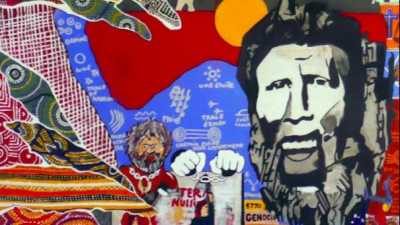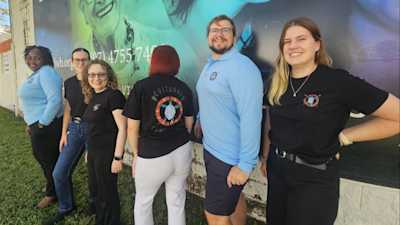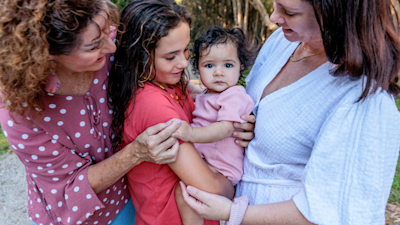NAIDOC Week celebrates the rich cultural heritage, history, and important contributions of Aboriginal and Torres Strait Islander Peoples across the nation.
Aboriginal and Torres Strait Islander people are advised that this story contains images and references to people who have passed. We have included them to acknowledge, honour and pay respect to them.
_________________________________________________________________________________
Each year, NAIDOC Week honours the rich cultural heritage, history, and contributions of Aboriginal and Torres Strait Islander Peoples. It is a time to celebrate the diverse Aboriginal and Torres Strait Islander cultures that have shaped the nation.
Each year, NAIDOC Week shares a special theme, and in 2024 the theme is " Keep the Fire Burning! Blak, Loud and Proud."
Why themes are important
NAIDOC Week themes capture the experiences and aspirations of Aboriginal and Torres Strait Islander Peoples. These themes have highlighted issues such as land rights, cultural revival, self-determination, and the importance of language preservation are a terrific way to centre an idea for the celebrations.

Image: The 2024 National NAIDOC Week Poster. Text: Keep the Fire Burning! Blak, Loud and Proud. 7-14 July, 2024. The Aboriginal Flag and Torres Strait Islander Flag sit beneath the text. NAIDOC Week - logo.
The 2024 Theme: "Keep the Fire Burning! Blak, Loud and Proud"
This year's theme, “Keep the Fires Burning! Blak, Loud and Proud,” invites all Australians to celebrate the ongoing contribution of First Peoples and encouraging a sense of pride in culture.
The artwork for this year’s theme shows ancestors hands placing an ember into a burning fire. This ember, and the fire, represents the sharing of cultural knowledge from one generation to the next.
“Culture is the fire that burns within all of us. It is essential to us when we talk about our people, identity, and spirituality,” Deborah Belyea, Artist.
“Throughout our lives, culture is taught to us by our Elders in our rich heritage languages, which have sprouted from our homelands. It shows us our roads to one another and how we belong to our Place or Country.”
Keep the Fire Burning
The fire represents the lasting strength of Indigenous cultures, passed down through generations despite many challenges by Indigenous communities. By honouring this flame, Australians can ignite a renewed commitment to recognising and preserving the cultural heritage that enriches our nation.
The 2024 Poster
An iconic feature of NAIDOC Week, the National NAIDOC Poster competition encourages Aboriginal and Torres Strait Islander artists to submit artworks reflecting that year's National NAIDOC Week Theme.
The winner of the 2024 National NAIDOC Week Poster Competition is Deb Belyea, a proud member of the Samuawgadhalgal (pronounced Sum-oo-ow-guth-ull-gull) Cassowary Clan, whose bloodlines stretch to the people of the top Western Torres Strait islands of Saibai (pronounced Si-bi), Dauan (pronounced Doo-un), and the Bamaga-Saibai (pronounced Bam-uga Si-bi) community of Cape York.
Living on the lands of the Juru people in Bowen, North Queensland, Deb is an educator, curriculum writer and practising artist.
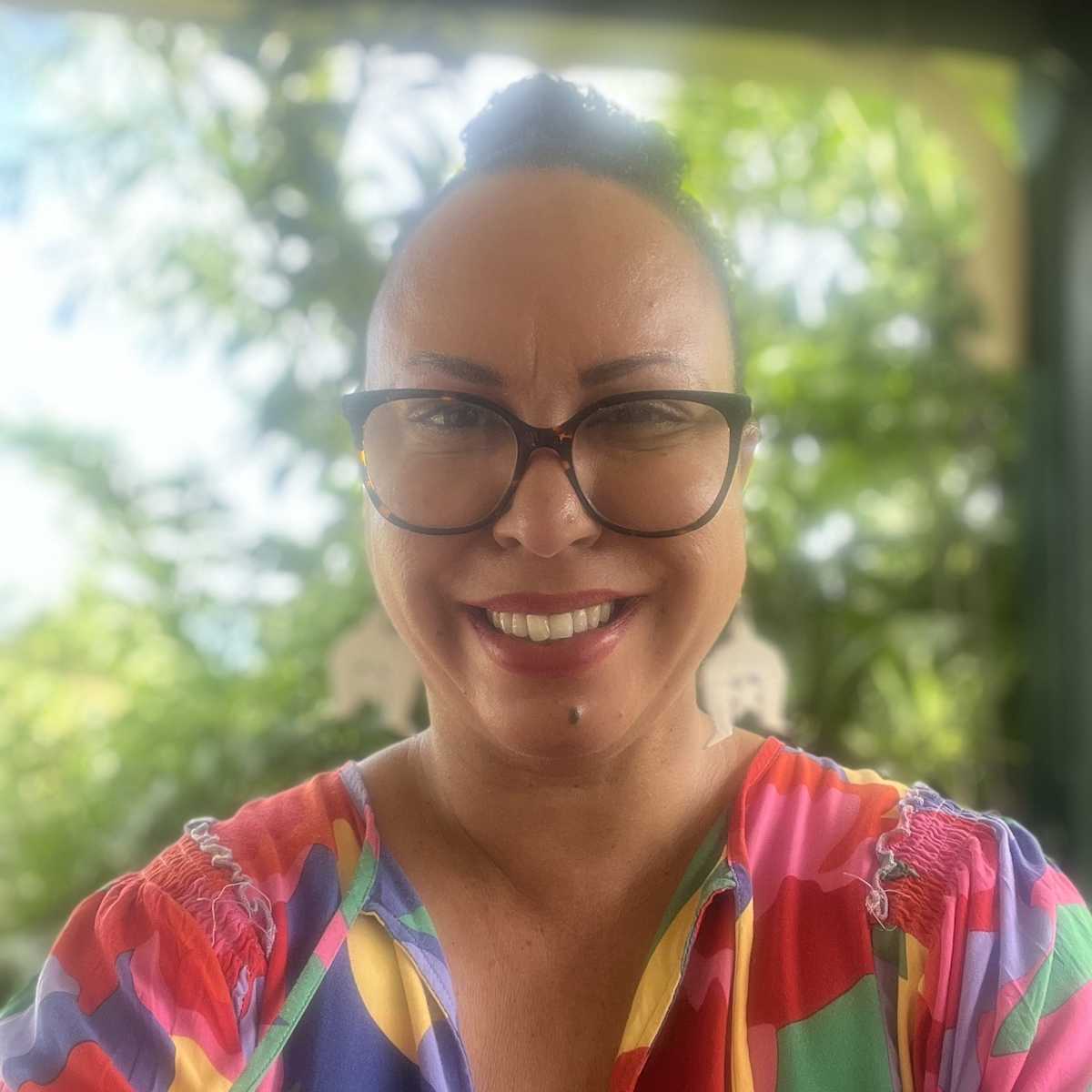
Image: Close up of Deb Belyea, wearing a colourful shirt and glasses.
Belyea's winning artwork titled ‘Urapun Muy’, (pronounced Oorr-up-oon Mooy), from the Kalaw Kawaw Ya (pronounced Kull-ow Koww-ow Yah) dialect of the Top Western Islands of the Torres Strait, meaning ‘One Fire’. The title of this work embodies this year’s theme, representing the fire Torres Strait Islanders and Aboriginal people have: their passion for their culture.
“When I saw that the NAIDOC theme for this year was Keep the Fire Burning! Blak, Loud and Proud, I wanted to create an art piece that reflected our First Nations cultures,” said Deb Belyea.
“In this work, I have depicted the hands of our ancestors that have carefully dropped a burning ember on to a fire. This ember burns hot with intensity, stoking the flames, as it combines with the new fire.”
“The linear detail shows the energy and power as cultural knowledge is transferred from our ancestors to us today. Culture is the fire that gives us knowledge, wisdom and purpose.”
“It is our responsibility to maintain, practice, and pass on our fire to our future generations. Afterall, Culture keeps us Blak, Loud and Proud.”
NAIDOC Week origins
NAIDOC Week can be traced back to the 1920s when Aboriginal rights activist William Cooper initiated the idea of an Aboriginal Day of Mourning. In 1938, marking the 150th anniversary of British colonisation in Australia, the Day of Mourning was held on January 26th, drawing attention to the dispossession and discrimination faced by Aboriginal and Torres Strait Islander Australians. Over time, this event evolved into an annual protest and commemoration.
In 1956, a significant turning point occurred when the then titled, National Aborigines Day Observance Committee (NADOC) was established. NADOC aimed to raise awareness about Aboriginal and Torres Strait Islander issues, advocate for rights, and promote reconciliation.
First celebrated on the first Sunday in July, the event expanded into a full week in 1974, becoming known as NAIDOC Week.
Over the years, NAIDOC Week has grown into a nationally recognised celebration that fosters pride, understanding, and unity among Aboriginal and Torres Strait Islander and non-Aboriginal and Torres Strait Islander Australians.
You can read more about the history of NAIDOC Week here.
You can find NAIDOC Week posters from 1972 to the present here.
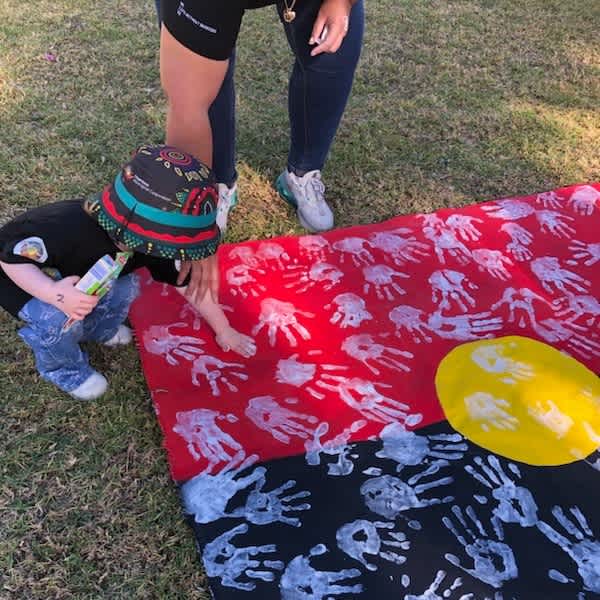
Image: A child is adding their handprint to an artwork of the Aboriginal flag.
Celebrating National NAIDOC Week
During the week-long celebration, held from 7 – 14 July in 2024, communities come together to engage in various activities, including cultural performances, art exhibitions, storytelling sessions, traditional ceremonies, and educational workshops. We encourage you to embrace National NAIDOC Week as an opportunity to celebrate, learn, and share Aboriginal and Torres Strait Islander culture at local activities and events held across the country.
Ways you can support NAIDOC Week:
Download the National NAIDOC Week Educational Resources and share what you learn with your friends and family.
Download and share the 2024 NAIDOC Week poster.
Learn whose Country you are on at AIATSIS Map of Indigenous Australia.
Learn how to do an Acknowledgement of Country.
Check you are using inclusive language for Aboriginal and Torres Strait Islander Peoples.
Engage with campaigns that support Reconciliation.
